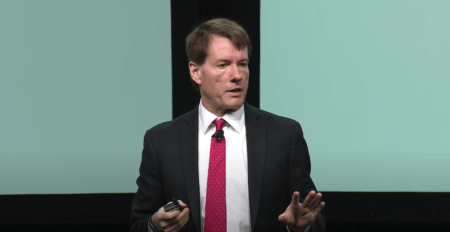The highly anticipated ‘Tangle in Taipei’ debate on Bitcoin and cryptocurrency between “the entrepreneur,” Arthur Hayes, and “the academic,” Nouriel Roubini, took place on Tuesday morning (UTC+8) at day two of Asia Blockchain Summit. Here’s how it went down.
Prior to the commencement of the debate – which was moderated by Andrew Neil of Press Holdings – a live Slido poll had Hayes as a 73 percent chance of reigning supreme. Little surprise, it would seem, given the composition of the major blockchain conference’s attendees.
Opening Statements
Roubini, a well-known economist and skeptic on cryptocurrency and blockchain technology, came out swinging against BitMEX – the “sick and rotten” industry’s top cryptoasset derivatives trading platform – lambasting its lack of know-your-customer (KYC) and anti-money laundering (AML) requirements.
BitMEX has ascended to prominence by “making money off of people going into financial ruin,” Roubini remarked; citing the Twitter account ‘REKT‘, the bio of which reads: “Bitmex liquidation bot. Immortalising those that have blown their margins. Not affiliated with @BitMexdotcom”
Hayes’ used his opening statement to rebut Roubinis critque of BitMEX’s high leverage, emphasising the innate propensity one has to engage in speculation saying that “human beings love to speculate.” He noted that in regulated markets investment products can be even more volatile than bitcoin, citing the XIV exchange-traded note (ETN) which plummeted 80% one evening in early 2018.
Ranting Roubini Takes Aim at ‘Dangerous’ Bitcoin
The various arguments put forward by Roubini – the professor of economics at NYU’s Stern School of Business – were exactly as anyone familiar with the industry would expect.
Reasons why he believes cryptocurrencies like bitcoin “are the biggest fallacies of this era” include problems surrounding immutability, decentralization, privacy, and scalability. Indeed, he feels as though more tangible, value-adding innovation is coming via the fintech space with innovations in big data, AI and IOT. When asked about the future for bitcoin and cryptocurrenices Roubini was sure that the bitcoin price will “go asymptotically to zero.”
“Blockchain is the most hyped technology in history and is no better than a spreadsheet.”
Hayes Highlights the Need for Bitcoin
What is so special about cryptocurrencies like bitcoin? According to Hayes, it’s because of its ability to provide the everyday person with “a choice;” something he deems increasingly important amid a world where “physical cash [is being] stripped away.”
Hayes noted that a political activist in Hong Kong, for example, may find bitcoin particulary useful. This arguement echoes the work of bitcoin analysts Hasu and Su Zhu in their excellent blog post titled ‘Bitcoin is a hedge against the cashless society.’
There is usually never a line at the train ticketing machines. Judging from an overheard convo, it appears that people are reluctant to use their rechargeable Octopus cards for fear of leaving a paper trail of them having been present at the protest. pic.twitter.com/s1rsgSnCqL
— Mary Hui (@maryhui) June 12, 2019
Other arguments expressed by the BitMEX co-founder in favor of Bitcoin related to network security, decentralization, and self-custody. Hayes agreed with Roubini that bitcoin does not yet compete with centralised payment systems on speed but said he believed scalability will come in time. Looking five years on he thought bitcoin will become a trillion dollar industry that will continue to change the way humans transact value.
So, Who Won? Roubini or Hayes?
Neither! That is, when measuring against each participant’s vote allocation at the time the debate started.
Indeed, as the ‘Tangle in Taipei’ progressed, as did moderator Neil’s proportion of total votes, from 2 percent at the time the trio walked on stage with Survivor’s Eye of the Tiger blaring, of course, to 34 percent by the close of polling; a parabolic surge akin to…well…cryptocurrencies.









